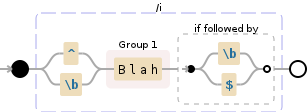
Specifying this flag may impose a performance penalty. When you specify UNICODE_CASE then it does CASE_INSENSITIVE matching using the Unicode standard. When you enable the CASE_INSENSITIVE flag, by default, it does matching using only the characters in the US-ASCII character set. However, by default, the expression dot (.) does not match line terminators. In DOTALL mode, the expression dot (.) matches any character, including a line terminator.


The other flags become superfluous.Įnables DOTALL mode. The flags CASE_INSENSITIVE and UNICODE_CASE retain their impact on matching when used in conjunction with this flag. There is no special meaning for Metacharacters or escape sequences. When LITERAL is specified then the input string that specifies the pattern is treated as a sequence of literal characters. In this mode, white space is ignored, and embedded comments starting with # are ignored until the end of a line. Permits white space and comments in pattern. Specifying this flag may impose a slight performance penalty. You can enable Unicode-aware CASE_INSENSITIVE by specifying the UNICODE_CASE flag in conjunction with this flag. In this mode, only the '\n' line terminator is recognized in the behavior of period (.).īy default, CASE_INSENSITIVE matching assumes that only characters in the US-ASCII character set are being matched. Table 6-2 Predefined Quoted Characters Flag

JAVA REGEX WHITESPACE FULL
The full list of acceptable characters and their semantics is listed in the following table: The flags string contains one or more characters, where each character is a flag specifying some particular behavior. For example, the regex "D.*" matches any string that starts with the character 'D' and followed by zero or more characters.įor the full list of supported predefined quoted characters see. The greedy quantifier (*) is a meta-character that indicates zero or more occurrences of the preceding element. The period (.) is a meta-character that matches every character expect a new line. Only the following constructs are supported: quoted characters, the quotation constructs, the period (.), and the greedy quantifier (*). Specifically, each character in a regular expression is either a literal character that matches itself, or a meta character, that specifies a "construct" having a special meaning. The syntax of the pattern string is a subset of the one supported by the java Pattern class, see. The pattern string is the regular expression against which the input text is matched.

If it can be detected at compile time that the first argument will never return a string, it raises a compile-time error.If that is not the case, it behaves as follows: Normally, the regex_like function expects each of its arguments to return a single string. A third, optional, argument specifies a set of flags that affect how the matching is done. The input string and the pattern are computed by the first and second arguments, respectively. ("Start, end = " + matcher.start()+", "+matcher.The regex_like function provides functionality similar to the LIKE operator in standard SQL, that is, it can be used to check if an input string matches a given pattern. Sb.append (s.substring (startNext, matcher.start())) Sb.append (s.substring (0, matcher.start()))
JAVA REGEX WHITESPACE CODE
Unicode defines 26 code points as \p") // multiple spaces You can’t use \s in Java to match white space on its own native character set, because Java doesn’t support the Unicode white space property - even though doing so is strictly required to meet UTS#18’s RL1.2! What it does have is not standards-conforming, alas.


 0 kommentar(er)
0 kommentar(er)
